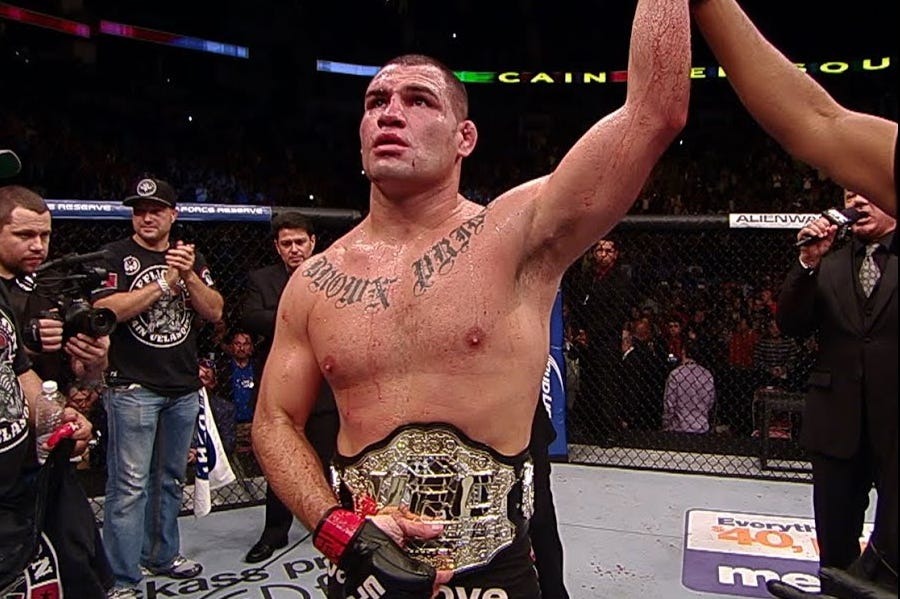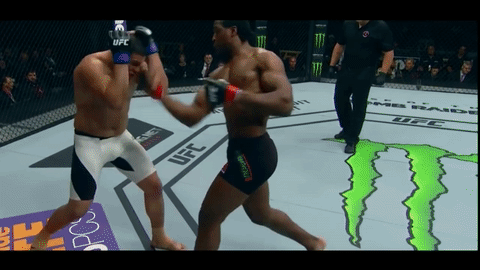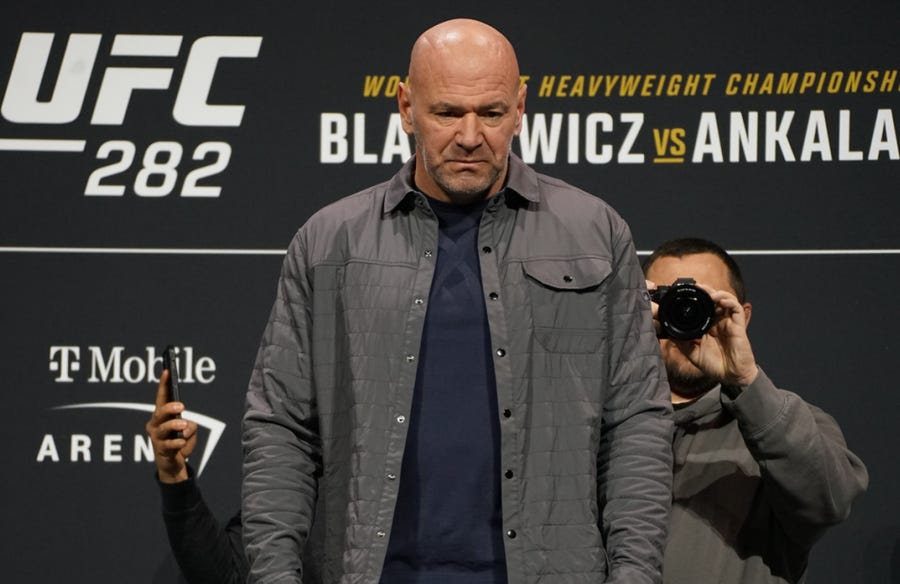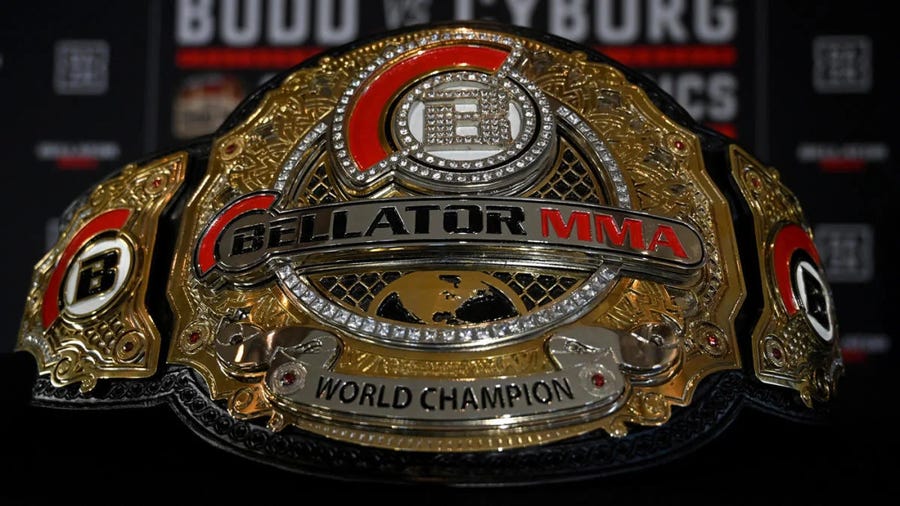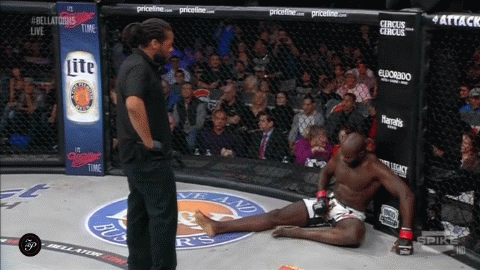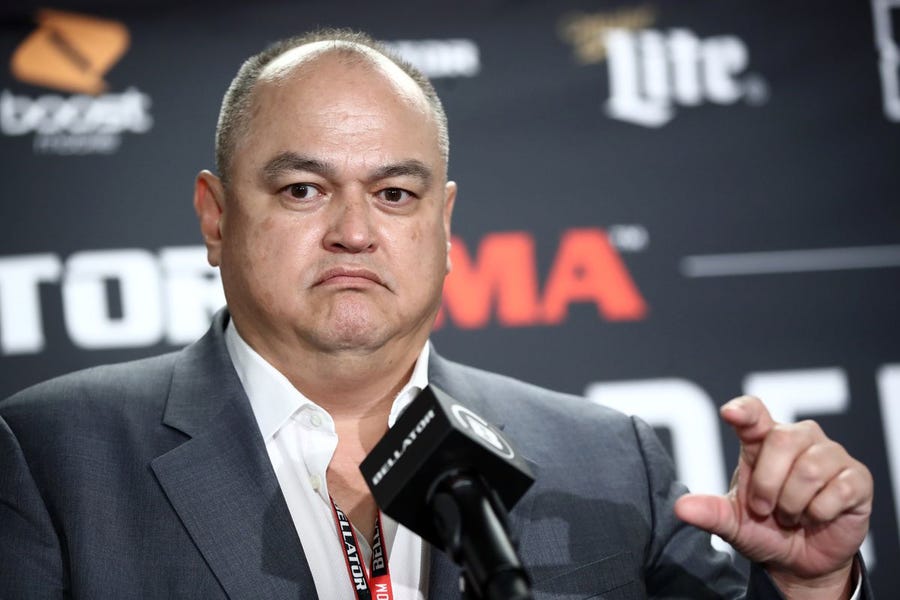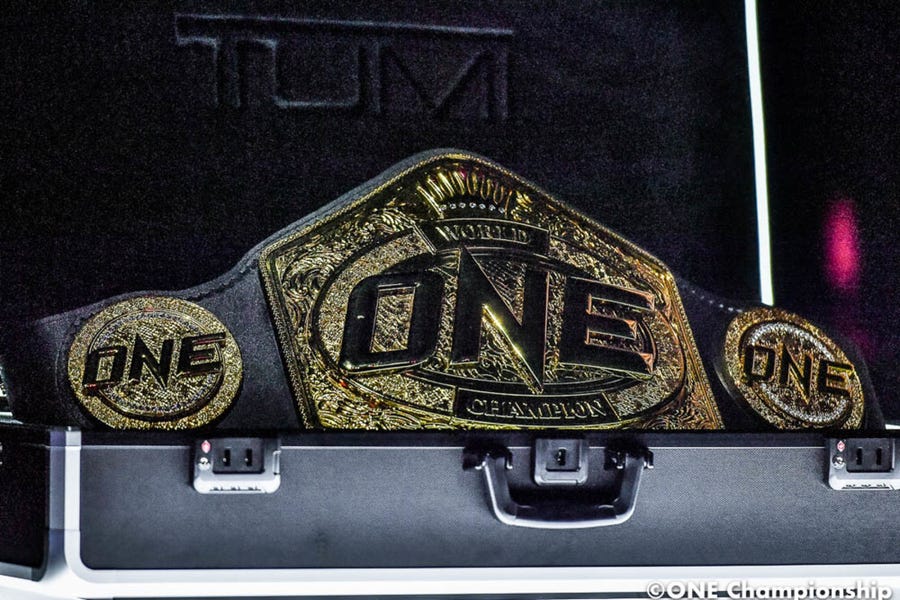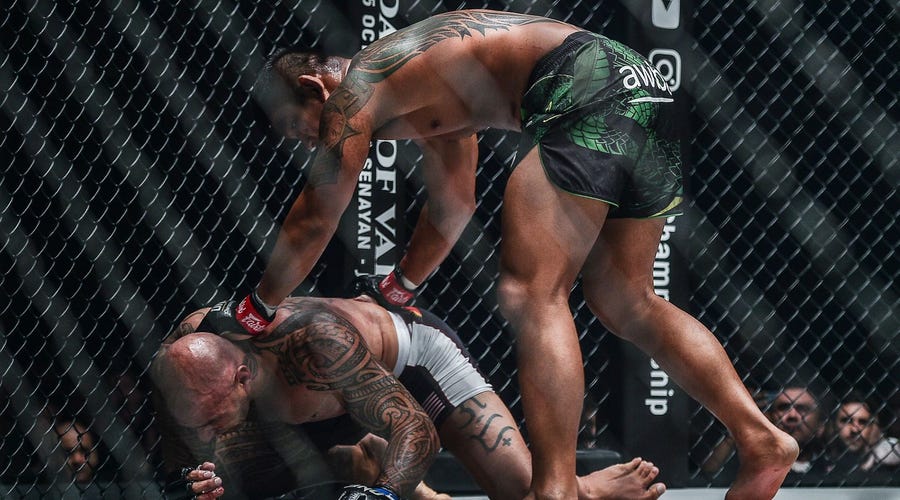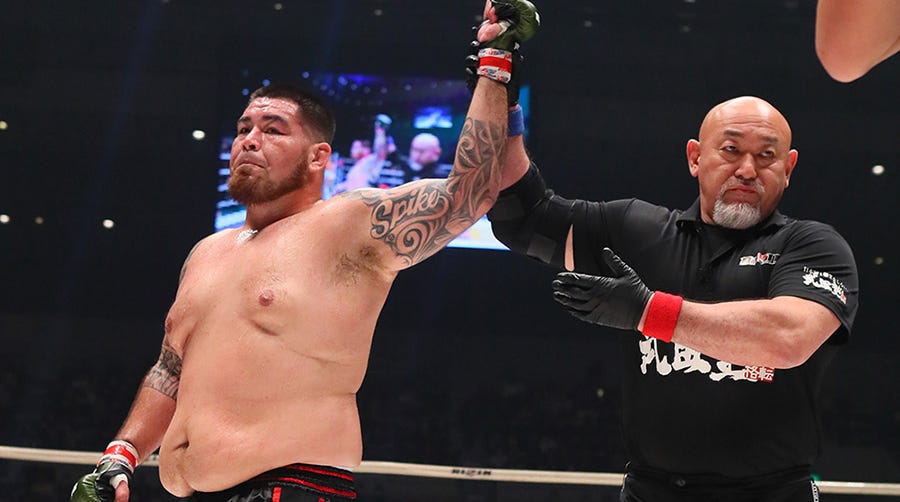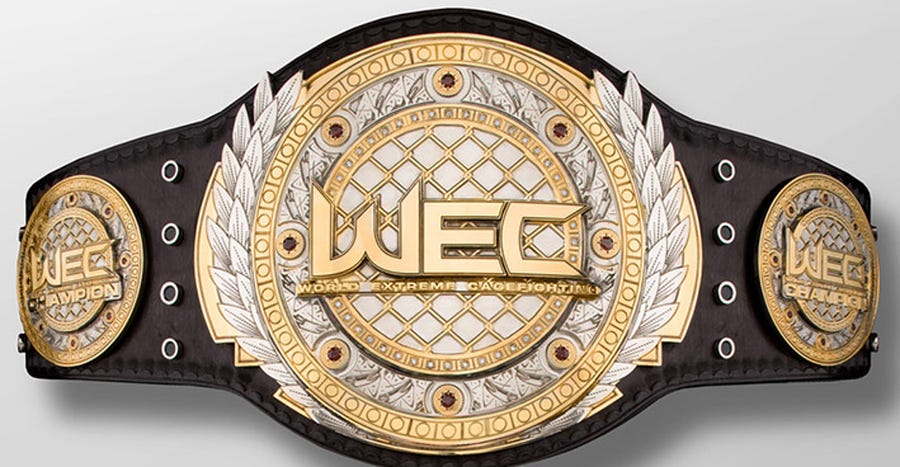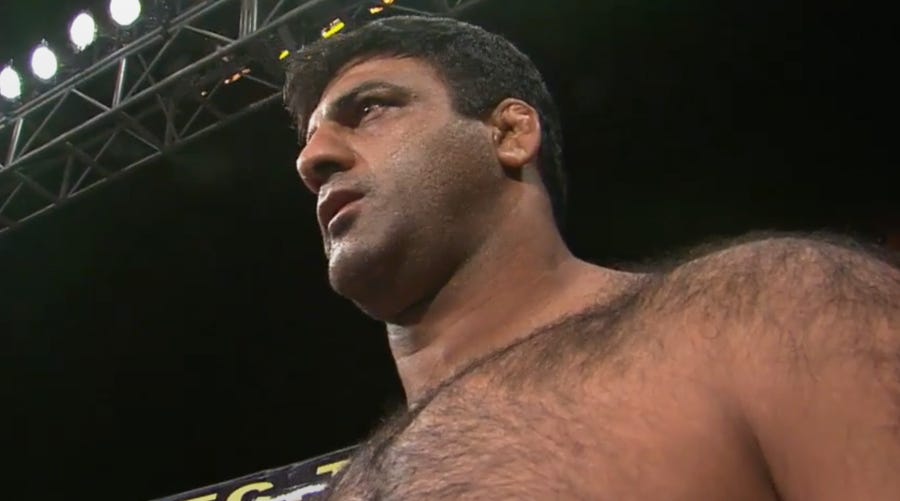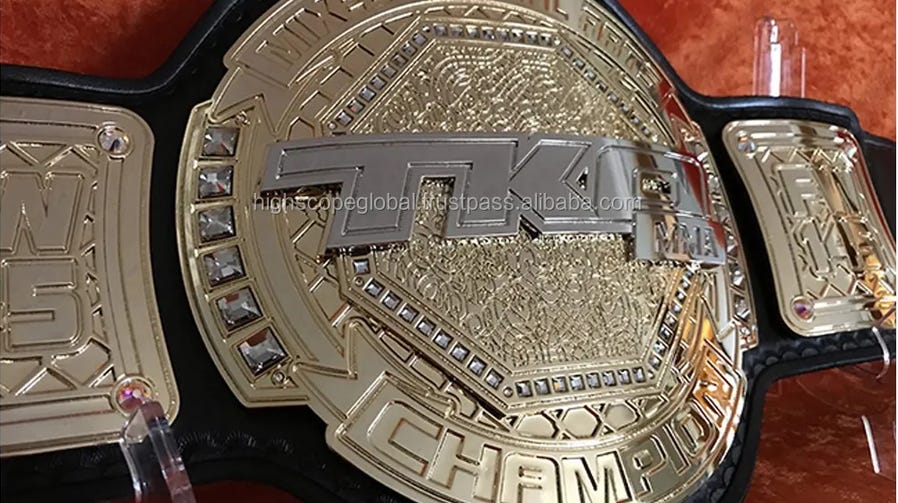The Tragedy of Trashweight: Volume 2
A heavyweight championship history, 2013-2023.
Ten years ago, I wrote The Tragedy of Trashweight, a history of the unfathomably cursed heavyweight divisions of mixed martial arts, from their superfight origins in 1993 to their canonical beginnings with the first UFC heavyweight championship fight in February of 1997 to Cain Velasquez regaining his title after battering Junior dos Santos in December of 2012. I had hoped my historical incantation would safeguard the heavyweight echelons of the sport; hoped that by putting its misery to words I would contain it and give to the bright-eyed youth of tomorrow a better, more innocent division, a division whose sin had been eaten and forgotten.
On January 14th, 2023, the UFC fired its reigning heavyweight champion and permanently severed the longest title lineage in the sport, and on March 4th the vacant title will be fought over by the last guy that champion beat and the figuratively and literally recurring car crash that is Jon Jones.
The sin has only grown, and it must be dragged once again into the light.
This is THE TRAGEDY OF TRASHWEIGHT: THE POETIC EPIC OF HUBRIS: VOLUME TWO.
In volume one, we covered the tumultuous path of the UFC's heavyweight division from its inception in 1997 to its then-present. We saw almost half as many champions get stripped as actually win the belt. We saw the mid-2000s introduce the era of interim titles and quickly threaten to outnumber the undisputed ones. We saw Randy Couture give press conferences showcasing his wide collection of plaid scarves. We saw a land of chaos that desperately needed a leader.
In 2012, Cain Velasquez was king. Many had scoffed at the rumored knee injury behind the 64-second knockout loss that cost him his title, but after handing rival Junior dos Santos a horrifying, 210-to-66-strike beating in their rematch, the scoffs were silenced. His recovery was incredible, his aggression was relentless and his cardio was the best in the weight class. Antônio "Bigfoot" Silva was only two fights removed from thrashing the still-feared Fedor Emelianenko when Cain turned him into a bloody smear on the canvas; thanks to an upset victory over Alistair Overeem, Bigfoot was once again a top contender, forcing Cain to dispose of him a second time, and this time it took less than a minute and a half. Junior dos Santos had defeated the inexplicably streaking fan favorite Mark Hunt in the co-main event, setting up a rubber match between the two former champions.
The 2013 rematch was even more lopsided, a 274-62 drubbing, and this time Cain finished Junior in the fifth round. No doubt remained: Cain Velasquez, just the third man to record two title defenses at heavyweight, was the greatest champion the division had ever seen. With his talents, and a heavyweight division being held down by his recently-signed teammate Daniel Cormier, the world foresaw a long, long reign for Cain.
Technically, we were correct. We simply didn't account for the trashweight curse. It would be almost two years before he fought again.
After years of wrestling, years of combat, and years of horrifying internet videos showcasing the American Kickboxing Academy's incredibly irresponsible strength and conditioning workouts that involved things like spasmodic deadlifts and tiptoe-balancing kettlebells, it was discovered Cain no longer had what would, in the traditional sense, be considered functioning muscles. He repeatedly injured his knees, his shoulders and his back, and after a year on the shelf, the UFC decided to fill the time.
Mark Hunt was not supposed to succeed. When the UFC acquired Pride, they also acquired Pride's contracts. The influx of fighters was a shot in the arm for the UFC's divisions, but they weren't interested in all of them--particularly in Mark Hunt's case. In the 2000s Hunt had been a K-1 Kickboxing World Grand Prix champion and a Japanese MMA superstar; in 2010, Hunt was 5-6 with two consecutive stoppage losses to men most famous for fighting at middleweight. The UFC attempted to simply buy him out of his contract, but he demanded the chance to fight--and lost, immediately. But then, shockingly, he came back the best he'd ever been, rifled off four straight knockout victories and even when defeated became one of the biggest fan favorites in the company.
Fabricio Werdum, on the other hand, had been somewhat given up by the MMA world. A highly-touted Brazilian Jiu-Jitsu Black Belt who became famous in Pride FC, he ultimately failed to ever truly set himself above the heavyweight pack, repeatedly losing to other Pride heavyweights and going 2-2 in a post-merger UFC. It was Werdum's presence in Strikeforce that saved his career. Fedor Emelianenko, in a blatant attempt to duck organizational champion Alistair Overeem, hand-picked Werdum, thinking him an easier fight. Werdum shocked the world by submitting Fedor in just sixty-nine seconds, ending the sport's biggest undefeated streak and propelling himself to stardom--after which he was immediately humiliated by Overeem. But the UFC had once again merged with the company that employed him, and he was once again in its ranks, and with his Chute Boxe-improved striking, Werdum was on a four-fight winning streak. With Cain on the shelf, the UFC put the star grappler against their biggest knockout puncher, hoping to crown a slugger of an interim champion for the real champion's eventual return.
Technically, they got what they wanted.
It wasn't shocking that Werdum beat Hunt. It was incredibly shocking that he knocked him out. The flying knee earned Fabricio Werdum the interim heavyweight championship and a great deal of respect from the UFC fanbase--but not nearly enough to favor him against Cain Velasquez who, after a botched season of The Ultimate Fighter (that did, however, give us Yair Rodríguez), two more surgeries and one last rescheduling, was back to reunify the titles, and he was a -500 betting favorite to batter Werdum. The world could not conceive of Cain losing this fight.
Cain, of course, lost this fight.
Once again, there were reasons--the fight was held at elevation in Mexico City, a blatant attempt to market Cain as the victorious Latino face of the UFC, and he had elected not to bother acclimating to the different oxygen level--but even before he gassed, Werdum was tagging him repeatedly. When he shot the worst takedown of his life and got wrapped up in a guillotine by one of the most dangerous grapplers in the sport his championship reign ended, and unbeknownst to everyone, his career did, too. Cain Velasquez, the best heavyweight in the world, would fight only two more times--once a year later at UFC 200 where he kicked the shit out of Travis Browne, briefly giving everyone a spark of hope, and one more fight three years, multiple injuries and a mandatory suspension for spinal spurs later, which saw him violently destroyed. (We'll come back to that later.)
Cain retired from mixed martial arts in 2019 to pursue his other passion, professional wrestling, and had extremely brief stints as both a luchador in Mexico's AAA and a wrestler in the WWE, where he hilariously gave Brock Lesnar his win back, but the curse--both of trashweight and American gun culture--would never let him go. On February 28, 2022, Cain was arrested for getting into a high-speed car chase with and ultimately attempting to shoot a man alleged to have sexually abused his son at a daycare. He missed, hit the man's father and several nearby objects, and was indicted on attempted murder. #Freecain became the rallying cry of a great number of prominent mixed martial artists because vigilante justice is cool and good when your friend does it. Cain Velasquez is still awaiting the date his trial will begin.
Back in 2015, the UFC had a new champion and against all odds it was Fabricio goddamn Werdum. The man who'd once visibly pled with Sergei Kharitonov to Get In My Guard, the man who'd been knocked straight out of the UFC by a Junior dos Santos uppercut, the man who'd buttflopped a dozen times against Alistair Overeem was the #1 heavyweight on the planet. And the mixed martial arts world, dutifully, transitioned into wondering if he was unbeatable. The great catch of Werdum's career had always been his deficient striking, but now he was dropping kickboxers and outboxing world champions. He could stand with anyone and he was the most dangerous grappler in the division, and that meant he was the most complete world champion in a very long time, the trashweight curse was broken, and Werdum would, assuredly, hold the belt for years to c
Werdum held the belt for less than a year, notching the shortest title reign since 2006. Stipe Miocic, a dark horse heavyweight who a year and a half prior had been getting outfought by Junior dos Santos, had managed to string together back to back knockouts over Mark Hunt and Andrei Arlovski, and the UFC tapped him to face Werdum in Curitiba, Brazil. In front of a hostile crowd and as a +250 underdog, Stipe dropped a wildly charging Werdum out cold on his face in less than three minutes.
It was a shock--and it also really wasn't. In 2016, the trashweight curse was the law of the land and the UFC hadn't had a stable heavyweight champion for an entire decade. Randy Couture beat Tim Sylvia, but immediately fell into contract dispute hell so bad the UFC was actively promoting and defending two heavyweight titles at once. Brock Lesnar held the belt, but diverticulitis required two separate interim championships during his reign. Cain Velasquez was murdered by Junior dos Santos; dos Santos was destroyed by Velasquez; Velasquez was destroyed by back problems. Fabricio Werdum wound up a flash in the pan. So of course, people sighed, this wrestleboxer who just lost to a more popular ex-champion and who was getting crushed by Stefan Struve a couple years ago is the champion now. Who cares, said the voice of cynicism. It won't last.
And because of that underestimation, Stipe Miocic became the one and only heavyweight champion to break the trashweight curse.
The heavyweight world is strewn with prominent martial artists. Olympic-caliber wrestlers, kickboxing savants, national sambo champions, black belt jiu-jitsu champions, internationally successful judoka, even the catch styles at the root of professional wrestling: Almost every successful heavyweight comes from some background in combat sports excellence. Stipe Miocic did not. His greatest athletic background came from college baseball. He spent some time wrestling in the NCAA, but never approached notoriety. He did some amateur boxing and won a Golden Gloves tournament in Cleveland, but washed out of the nationals. When he had his first professional bout he'd been training professionally for less than a year. Nothing in his background suggested a great future laid before him.
Stipe Miocic is, indisputably and unequivocally, the greatest UFC heavyweight champion of all time. He knocked out Alistair Overeem and Junior dos Santos in one round apiece and, despite being a betting underdog for his own championship defense, upset the meteorically rising Francis Ngannou. He was the first and thus far only champion to record three title defenses in a single reign, and at 784 days he holds the longest--unabridged--heavyweight reign in UFC history. (Cain Velasquez technically has the longest at 896 days, but he spent 602 of those days not actually fighting.) Against all odds, with no expectations, Stipe Miocic, the part-time firefighter, became the best there ever was.
But nothing good can last.
In a different era, Daniel "DC" Cormier might have been the best fighter of the generation. A six-time national wrestling champion, a two-time Pan-American wrestling champion, and a man who fell just one spot short of claiming a medal at the 2004 Olympics. When his bid at the 2008 games ended thanks to his kidneys officially giving up on his efforts to cut weight, Cormier slid over to mixed martial arts. Within a year he was a professional, within two he held multiple regional titles, and after three years he was the Strikeforce Heavyweight Grand Prix champion, having flattened Bigfoot Silva and handed Josh Barnett his first loss not to come from a Cro-Cop or Nogueira in eleven years. After the UFC purchased Strikeforce he continued his winning ways, but had to reevaluate his career, as his training partner and friend Cain Velasquez was its champion. So he started making the much more manageable cut to 205 pounds, and over the next half-decade he defeated every single person at the division--except one.
Everything comes back to Jon Jones. Daniel Cormier was better than anyone on the planet except Jon Jones. Until 2019, Daniel Cormier's record was 22 wins, 1 loss to Jon Jones and 1 loss to Jon Jones that became a No Contest after he tested positive for steroids. It didn't matter that Jones was a raging hypocrite famously caught on a hot mic slipping out of his choirboy character to call Cormier a pussy and talk about murdering him: He was still the better fighter. And Cormier won the championship anyway, because Jones was too much of a fuckup to not get repeatedly stripped and removed from contention. Cormier even lost the belt BACK to Jon Jones, only for the aforementioned steroid bust to retroactively reinstate him as champion. But Cormier knew his time was running out, he knew waiting for yet another Jones rematch was a lost cause, and in a post-Conor McGregor world, he knew the real path to stardom.
The UFC booked its champion vs champion match for UFC 226, and Daniel Cormier became the second-ever simultaneous double-champion in UFC history, knocking Stipe out in one round after catching him with a right hook coming out of the clinch. Much like McGregor he would vacate the lighter belt rather than manage both weight classes, but much unlike McGregor he would actually record a successful title defense, choking out Derrick Lewis at the height of his power. The second-best light-heavyweight champion wanted to be the best heavyweight champion, and this time, nothing was going to stop him.
Except Stipe.
Repeatedly.
Miocic would not be denied. A 2019 rematch saw Stipe avenge his loss, battering Cormier with body shots to force a fourth-round TKO, and the inevitable rubber match one year later saw Stipe win again, this time with a unanimous decision. The greatest of all time was back in his throne. There were only three people who'd beaten Stipe and he'd now avenged two of those losses--Stefan Struve's retirement made the last one tricky, but he had also gone 4-8 since their fight, making it somewhat irrelevant. He had slain all his enemies, he was the fifth man to hold the heavyweight championship twice, the only one to defend it three times and thanks to his second reign now had four defenses in total, making him the all-time leader over Randy Couture. At the turn of 2021 he passed 1300 combined days as champion, outstripping Cain's injury-laden record and making him the longest-reigning heavyweight champion in history.
In every conceivable metric, he was the greatest heavyweight the UFC had ever seen.
And the world was pretty sure he was about to lose.
It's hard to properly contextualize just how terrifying Francis Ngannou was. Fortunately, if you image search his name, a funny thing happens.
Knockout artists were nothing new to the heavyweight division, but knockout artists who crushed people as violently and consistently as Francis Ngannou were rare. He earned his first shot at the championship after just two years with the company--enough time to record six straight finishes including a submission by kimura which was somehow even scarier--but in 2018, Ngannou just wasn't ready. Like so many power punchers, Ngannou had never had to truly push himself against adversity. The longest fight of his life had lasted ten minutes. Thrust into a five-round fight against the greatest heavyweight in the world, Ngannou found his weapons stifled by Stipe's jabbing and wrestling, and after three rounds he was too exhausted to muster any offense at all. A followup fight that summer against Derrick Lewis became the first blemish on Ngannou's relationship with both the fans and the UFC's top brass: Everyone had assumed a fight between the two most prolific punchers in the heavyweight division would produce fireworks, because they forgot about the fucking curse. What ensued was one of the least eventful fights of the year, with the first two rounds seeing both men average one landed strike per minute. The third round upped it to a blistering three.
Ngannou lost the decision. The world soured on him. The UFC used its post-fight press conference to remark on how terribly he'd done. No one likes a puncher who won't pull the trigger. Six finishes or no, two bad performances meant the fanbase was prepared to move on.
Francis Ngannou was not prepared to move on.
Ngannou's next four fights were even scarier. Curtis Blaydes was on a four-fight win streak and had just returned to the top five after crushing Alistair Overeem: Ngannou dropped him in forty-five seconds. Cain Velasquez, after three years of hiatus, was happily on the comeback trail vowing he was healthier and better-trained than he'd ever been before. We never got to find out: Ngannou knocked him out in twenty-six seconds. Junior dos Santos had rebounded from his loss to Miocic with three straight victories, including stoppages over future contender Tai Tuivasa and top dog Derrick Lewis, and he put up a much stiffer fight, because it took Ngannou a whole minute to take him out. A new contender had risen up the ranks while all of this played out, a heavyweight kickboxing champion named Jairzinho Rozenstruik with an undefeated 10-0 record who had, himself, also just finished off a surging Overeem, and the world wondered how Ngannou's powerful but loopy punches could possibly handle a technical striker. It only took twenty seconds to find out.
When Francis first fought Stipe in 2018, he'd come into the bout as a betting favorite despite Stipe's record. The lines for the rematch were, understandably, much warier, with Stipe holding out as a very slight favorite.
They were wrong. Francis Ngannou was no longer the unprepared prospect of three years prior. The Ngannou Stipe met on March 27, 2021 was a complete fighter, one who easily countered Stipe's jabs, evaded his takedowns, and even, shockingly, landed one of his own. One minute into the second round, the greatest heavyweight reign came to an end.
It was one of those rare circumstances where everything works out perfectly. Despite his success, the UFC had never loved Stipe as their titleholder. He didn't like to talk trash, he didn't build promotional feuds, he dared to use the forbidden art of wrestling and he committed the unforgivable sin of pointing out the UFC's habit of hyping up all of his challengers more they did him. The UFC put Stipe and Ngannou on a media tour together in the hopes of building a media-friendly feud and all they got in return was lots of footage of Stipe calling Francis a nice man with great taste in shirts.
They were thrilled that Francis Ngannou had crushed him, and they were thrilled that Francis Ngannou was a champion, and they were right to be. Ngannou was the perfect heavyweight for the UFC: A huge, visibly terrifying wrecking ball of a man who was also soft-spoken and funny, a French-Cameroonian import with two built-in international fanbases, a man with an inspiring personal journey from destitute immigrant to the best heavyweight on the planet, and, most importantly, a man nearly guaranteed to produce at least one mainstream-accessible, highlight-reel knockout every year, even when fighting the best.
Francis Ngannou might have been the most promotionally perfect heavyweight champion an MMA organization had ever seen. He was the surest thing of sure things, a fighter too laden with positive traits for any company to possibly fuck up.
The UFC, of course, immediately fucked it up.
Because this is fucking trashweight, and nothing good can stay.
Immediately after Ngannou's championship victory, the UFC sent him paperwork for his first title defense. They wanted him fighting again just four months later in August. Ngannou wasn't entirely unwilling, but requested the fight be pushed one month back to the September pay-per-view, so that he had time to both take a couple weeks to enjoy his victory and properly prepare for his first defense. The UFC responded with a power play so unprecedentedly blunt and public it raised media eyebrows across the world: Not only was Ngannou no longer defending his title at all, but just five months after he won it, despite his being perfectly healthy and willing to fight, the UFC was going to crown an interim heavyweight champion--and it was going to be their newer, more corporately friendly French kickboxer.
Ciryl "Bon Gamin" Gane was a contender the moment he walked into the UFC. An undefeated Muay Thai champion in his native France turned undefeated MMA champion through Quebec's TKO, the promotion that gave us Georges St-Pierre, David Loiseau and Patrick Côté, Gane's talents were undeniable. Where most heavyweight strikers succeed through brute force and aggression Gane was a true technician, as sound defensively as he was offensively. In 2021 he was 9-0 with six straight wins in the UFC, and those six had seen him barely even touched, let alone ever in danger. A championship showdown between Ngannou and Gane was all but inevitable--but no one in the fanbase had wanted it precipitated this way. The UFC set Gane up against Derrick Lewis for the interim title, and the battle of "fast, precise defensive mastermind" vs "lumbering punch monster" went exactly as expected: Gane picked Lewis apart and stopped him in three rounds. After almost a year of tension and negotiation the UFC set up a unification bout between Francis Ngannou and Ciryl Gane for January 22, 2022, and the world waited to see if Gane's artistry would reign supreme.
And Francis Ngannou, knockout puncher extraordinaire, shocked the world by wrestling the shit out of him. Having attempted only three takedowns in his previous thirteen UFC bouts combined, Ngannou responded to a difficult opening of the fight by adjusting and simply tossing Gane around like a ragdoll. While some were disappointed not to get a striking showdown, more were terrified by the idea of a Francis Ngannou who was actively improving and adding wrinkles to his game. If he could knock out anyone on the planet AND wrestle if it happened to not work out, what was next?
The answer, unfortunately, was: Nothing.
What had started as disagreement over scheduling and proceeded into disputes over pay had developed into a public contract war between Francis Ngannou and the UFC, the likes of which hadn't been seen since the acrimony with Randy Couture a decade and a half prior. Francis was an internationally-recognized superstar and one of the UFC's biggest attractions, but he was still barely clearing a half-million guaranteed dollars to fight--before taxes, cuts and expenses. Unlike most fighters, rather than folding, Ngannou attempted to use his leverage: The more publicly the UFC tried to humiliate him, the more public he became with the reasonability of his demands. He wanted the right to have sponsorships, like fighters did before the UFC took them away. He wanted fighters to have an advocate at the corporate level, which they'd always been denied. And he, personally, wanted to fight the heavyweight boxing champion of the world, Tyson Fury, who'd very publicly expressed interest in the idea--and, as Francis pointed out, the UFC had been more than happy to accommodate Conor McGregor when he spent a full year chasing Floyd Mayweather, Jr.
The UFC had no interest in accommodating Francis. After a full calendar year spent negging him in progressively more visibly irritated ways, at the turn of 2023, Dana White announced that their heavyweight champion's contract had expired and the UFC was going to make no attempt to renew it.
In hindsight, the heavyweight world was overdue for a crisis. Between 2015 and 2021, there were almost no shenanigans in the division. No interim championships, no stripped belts, no massive injury layoffs. The simple act of the belt passing through five consecutive, undisputed champions was a feat that had never before happened not just in the UFC, but in any major mixed martial arts organization, ever. No heavyweight division had ever maintained that level of stability. We didn't know how good we had it.
But we knew that it was over.
The UFC Heavyweight Championship is the oldest extant title in mixed martial arts. Just to drive myself crazy, I mapped out every heavyweight championship belt across the entire sport that I could determine had at some point lineally folded into its legacy, and the list is staggering and spans the entire world.
In America, it encompasses the heavyweight titles of:
Strikeforce
The International Fight League
King of the Cage
The World Series of Fighting/Professional Fighters League
The Cage Fury Fighting Championships
Battlecade Extreme Fighting
Elite Xtreme Combat
Icon Sport SuperBrawl
Shark Fights
Tachi Palace Fights
And in Japan:
Pride Fighting Championships
DREAM
Pancrase
Fighting Network RINGS (technically an openweight title)
The Heavyweight Lumax Cup
Down in Brazil, the sport’s modern progenitor:
Jungle Fight
The International Vale Tudo Championship
Over in Britain:
Cage Warriors
Cage Rage
Cage Contender
And can we do Germany? You bet we can:
Respect Fighting Championship
What about a stop in Finland:
Finnfight
All the way out in Russia:
Fight Nights Global
Over by Australia:
The Australian Fighting Championship
Even in South Africa, they still picked up:
Extreme Fighting Championship
And lest we forget our neighbors to the north in Canada, there’s still:
TKO Major League MMA
The Maximum Fighting Championship
And that’s what happens when you’re the global home of the sport. With very few exceptions, the UFC has never actively tried to absorb title lineage—title lineage is a thing only nerds care about—but by simply existing as the center of gravity for a worldwide sport, it repeatedly drew the sport’s heavyweight history into itself. Even when the UFC's own heavyweight championship hit its many, many bumps in the road, it always found its way home.
With Francis Ngannou gone and seemingly pursuing a boxing career, the trashweight curse has come full circle and fed upon its bounteous harvest. The thirty-year lineage of heavyweight mixed martial arts is over. The belt Ciryl Gane and Jon Jones will fight for is a new, hollow, empty thing that was born in a boardroom and is destined to be lost in yet another Ciryl Gane contract dispute or Jon Jones car crash.
And all of this because the UFC was angry fighters were making too much money from Condom Depot sponsorships.
One day, if we are lucky, the spirit of heavyweight will come back.
But for now, the tragedy of trashweight has, at last, come to pass.
But that's just the UFC. Surely, outside the confines and pressures of the world's biggest fighting organization, heavyweight must have escaped the curse and flourished, right?
When last we left Bellator's heavyweight division, it was in crisis. The tournament to crown its inaugural champion had resulted in the discovery of Cole Konrad, an amazing wrestler who won the belt, waited almost two years for Bellator to crown a #1 contender, submitted him in sixty seconds and immediately retired. Another tournament to fill the newly-vacant belt came down to failed light-heavyweight contender Rich Hale and 6'7" Alexander Volkov. At the end of 2012, Bellator had its stable heavyweight champion again.
His reign was one fight long. In his first defense he was punched out by Vitaly Minakov. "The New Emperor," which was either a tribute to or dig at Fedor depending on who you asked, was the kind of star Bellator had been waiting for: A scary, undefeated, 6'3" Russian knockout machine, backed by the legitimacy of his very real championships in sambo, judo and wrestling. Bellator had begun acquiring mid-tier UFC fighters in an attempt to build recognizable cards, and thus five months later set his first title defense against their newest toy, former top ten UFC heavyweight Cheick Kongo. It was Bellator's own Fedor vs a former UFC star in a sure barn-burner.
It was not a barn-burner. It was a weird clusterfuck of a fight and it had everything you could ask for out of trashweight: Point deductions for low blows, interminable takedowns with no action, a half-dozen warnings for grabbing of the shorts and cage, and a full five rounds of mostly-forgettable fighting. But at the end, while it may not have come with the highlight-reel finish they had hoped for, Bellator still had what they wanted. After four years, the championship had just its second title defense and Bellator had its undefeated, reigning, defending champion in the biggest money division in the sport. All they had to do now was wait for the fans to notice.
As it turned out, they would be waiting for a very long time.
Five years. Just nine weeks shy of five years. That's how long it took for Bellator to promote a heavyweight championship fight again. In the time it took even the glacially-paced UFC to stage eight heavyweight title fights, Bellator didn't manage a single one. Former Strikeforce boss Scott Coker was hired to run Bellator in mid-2014, there were a number of talent shakeups, and somewhere in the mists of backroom deals and shady negotiations Vitaly Minakov took his ball and went home. He began fighting for Russia's Fight Nights Global while still under contract with Bellator, and after two years of the two sides being unable to come to terms, Minakov was stripped--but not released. Bellator could play rough contract games just as well as the UFC, and their competitor's interest in the undefeated Russian meant Bellator wanted to ensure they could not have him. Minakov was kept locked out of the international market for years, and eventually came home to Bellator's loving arms in 2019, where he was welcomed back with...a rematch a half-decade in the making against Cheick Kongo. Which he lost. Congratulations.
Scott Coker had a choice. He could, theoretically, have made any match he wanted for the vacant championship. He, of course, did not. Bellator wasn't built on matches, it was built on tournaments, and Scott Coker was a man who had presided over the most successful B-league in American history to that point, Strikeforce, and run it the fuck into the ground by chasing his two biggest mixed martial arts dreams: Glitzy tournaments with Japanese-style mixed martial drama, and his eternal hope of putting a championship back on the waist of the biggest heavyweight star outside of the UFC, Fedor Emelianenko, who had thankfully retired after getting repeatedly blitzed in Strikeforce's waning days.
And then Fedor came out of retirement.
And then Bellator signed him.
And then his grand return to America ended with Matt Mitrione knocking him out in a minute.
And the MMA world shuddered, for it knew what would come next.
Bellator, inevitably, announced the tournament. It was, counting the one that inaugurated the division, the third tournament to crown a vacant champion in a division that had only ever had three champions. But Scott Coker, visibly salivating, promised the greatest array of talent a heavyweight tournament had ever seen. The 2018 Bellator Heavyweight Grand Prix would be:
Ryan Bader, who'd left the UFC a year earlier and become Bellator's light-heavyweight champion, making his heavyweight debut
Muhammed "King Mo" Lawal, a career light-heavyweight who fought at heavyweight only in occasional excursions to Japan, where in his last fight at the class he'd been destroyed by a mid-forties Cro-Cop
Matt Mitrione, a former NFL player and UFC fighter who'd been released in 2016 on a losing streak and was now unavoidable for Bellator as the man who killed Fedor's returning hype
Roy Nelson, winner of The Ultimate Fighter: Heavyweights back in 2009, who'd been a journeyman in the UFC for almost a decade and had been released after going 3 for his last 10
Fedor Emelianenko, once considered the greatest heavyweight of all time, who'd left the international scene after getting smashed three consecutive times in Strikeforce, retired twice, and returned only to lose immediately
Frank Mir, former UFC heavyweight champion, who had been released from the UFC after going 2 for his last 8 and getting suspended on his final loss for a positive steroid test
Chael Sonnen, a career middleweight, who had been released from the UFC back in 2013, retired, unretired for grudge matches against the similarly semi-retired Tito Ortiz and Wanderlei Silva in Bellator and was down to clown
Quinton "Rampage" Jackson, former UFC light-heavyweight champion and Bellator's 2014 light-heavyweight tournament winner, who was too old and tired to cut weight anymore
If you looked closely, it was an extremely dire bracket. But if you didn't, it was five world champions, multiple MMA superstars and a man many considered the greatest heavyweight of all time. What could go wrong?
The tournament was lousy. Bader knocked out King Mo in fifteen seconds, Mitrione and Nelson put on one of the worst fights of the year, Frank Mir looked lost and exhausted seconds into his fight with Fedor and Rampage Jackson was a shadow of his former self, unable to cope with the wrestling of retiree and pizza magnate Chael Sonnen. The semi-finals weren't much better: Bader ground Mitrione into paste with a fifteen-minute wrestling assault and Sonnen didn't make it out of the first round against Fedor. Scott Coker didn't care. He was pleased as punch. Bellator had exactly what it wanted: A tournament final featuring Ryan Bader, the company's potential double champion, and Fedor Emelianenko, the most internationally visible heavyweight on the planet. They'd gotten their dream match, and no matter who won, the fight would be good, the company would have an active, celebrated champion, and the tournament had left a field of heavyweights to fill out the division. Bellator couldn't lose.
The fight lasted thirty-five seconds. It was over in one punch.
King Mo never fought at heavyweight again. He'd retire three fights later, having been knocked out in each.
Matt Mitrione's next fight ended in a no-contest after he broke Sergei Kharitonov's groin in fifteen seconds. He lost his next three fights by knockout and was cut from the company.
Roy Nelson fought for Bellator four more times. He lost each time. Bellator fired him in 2020.
Fedor Emelianenko won a comeback fight in Russia against a visibly obese Quinton Jackson. He wouldn't fight again for two more years, a knockout victory over Timothy Johnson, and wouldn't fight again for another two years thereafter, at which point he had a retirement rematch against Ryan Bader. He was, once again, knocked out in the first round, and has vowed to never return.
Frank Mir attempted a comeback later that year only to tap out to the ferocious punches of Javy "Eye Candy" Ayala. He'd win one last fight a year later, defeating the even more deteriorating Roy Nelson, before Bellator let him go. He moved into professional boxing, where he is 0-2.
Chael Sonnen fought only once more, and it was back at light-heavyweight against Lyoto Machida. He was knocked out in the second round and announced his retirement immediately afterward.
Rampage Jackson fought an incredibly unnecessary grudge match against Wanderlei Silva at the end of 2018, which he won, and made one last appearance a year later against Fedor in Japan. He showed up to the fight grossly out of shape, appeared gassed simply from entering the cage, and was knocked facefirst to the canvas in less than three minutes. He's been a free agent ever since.
So, okay, the tournament roster was a bust. Fine. It didn't matter. Bellator had Ryan Bader now, baby.
Not only was he Bellator's first heavyweight champion in half a decade, he was their first double champion, period. The MMA world loves double champions! Nothing could be better! It was all looking up for Bellator, and nothing could possibly go wrong.
You would think Bellator would realize putting Cheick Kongo in title matches was a recipe for disaster. Ryan Bader's first title defense, eight months after his victory, went to a No Contest after just four minutes when Bader poked Kongo in the eye and left him unable to continue. After five years, the heavyweight championship's first flight in the clouds had crashed and burned.
Things were further complicated by Ryan Bader's insistence on being a reigning, defending double champion. That included his light-heavyweight title, which he had defended only once in November of 2017 before the championship went on hiatus while Bader fought out the heavyweight tournament. After waiting even longer, #1 contender and Fedor protege Vadim Nemkov got his shot at the man who slew his teacher on August 21, 2020. Bellator hyped the crap out of it--a student with a grudge, a championship reborn, the double-champ they called the greatest heavyweight and light-heavyweight in the world reminding people why he was the best.
Nemkov knocked Bader out in two rounds. The double-champ dream was over. One would have thought Bellator, having lost it, would take peace in the chance to focus on each division individually. But to do so, one would have to overlook Scott Coker's insatiable lust for tournaments. Ryan Bader, having held up the light-heavyweight division for more than a year to chase the 2018 Bellator Heavyweight Grand Prix, decided it was only fair to hold up the heavyweight division for more than a year to chase the Bellator 2021 Light-Heavyweight Grand Prix. The full story of that equally doomed tournament is a tale for another day: Today, we care only for Ryan Bader, and his attempt to remind the world that he was its king.
Corey Anderson, released by the UFC just a year prior, knocked him out in under a minute in the semi-final round. The message could not be clearer. Light-heavyweight was a dream of the past. Ryan Bader swore he would fight out the rest of his career at heavyweight. And he had a challenge waiting for him.
Valentin Moldavsky was yet another in the seemingly endless array of students out of Fedor's personal team who wanted revenge on Bader. A sambo specialist with a penchant for long, grinding decisions and a one-time prospect in Rizin who'd been bounced from their 2016 Grand Prix by living steroid golem Amir Aliakbari, Moldavsky had moved over to Bellator in 2017 and quietly racked up five straight wins. No one really paid him much heed--he was quiet, his style didn't turn many heads and his only stoppage victory was over the inexplicably present 1-1 fighter Ernest James--but he was there, and with Bader busy, Bellator needed an interim champion. In June of 2021 Moldavsky fought UFC cast-off Timothy Johnson, one of the only heavyweights in history who was released on a victory after the UFC simply got tired of watching him fight. It was an inkblot test of a bout--there was so little to truly score the fight that different commentators swore both men clearly needed a finish to win--but the judges sided with Moldavsky, giving Bellator its gap champion.
But the gap wouldn't last long. Bader was ready to go six months later, and he ground Moldavsky out with the same uneventful style that had made him a forgettable asset for the UFC a decade and a half prior. Media scores favored Moldavsky, but the judges did not care. The titles were unified, the tournaments were over, and now, finally, three years after winning the title, the Bader Days could begin. So Bellator, seeing this new beginning for the heavyweight championship, did the only thing they knew how to do:
They made him fight Cheick Kongo again.
It was Bellator's first card in Paris in two years, and only the second ever. The first time, two years ago, Timothy Johnson had slowly ground the notably French Kongo to a fifteen-minute decision while the ground registered its displeasure. This time, Ryan Bader, the greatest heavyweight champion in Bellator history, ground Kongo out for twenty-five minutes, somehow inflicting even less damage despite the two extra rounds to work with. The furious crowd drowned the commentators out with boos, but nothing would deter Bader from wrestling his way to victory.
It would be nine months before Bader fought again. Fedor had been granted a title shot on the strength of his defeating Timothy Johnson almost two years prior, but it was his retirement match and it was Bellator, and you cannot sacrifice the legitimacy of a title that has none to give. The MMA world spun itself in circles about the potential fairytale ending for Fedor, but there are no fairytales at trashweight. Bader crushed him in two and a half minutes.
There is no future for the Bellator heavyweight championship. Ryan Bader's next opponent is, in all likelihood, either Linton Vassell, the man he beat at light-heavyweight six years ago, or Valentin Moldavsky, the man he beat in 2020. Maybe he'll beat them again. Maybe he won't. Only one thing is for sure:
Whoever wins will, one day, fight Cheick Kongo.
In the time between the two chapters of the tragedy, ONE Championship rose to become the second-biggest mixed martial arts organization on the planet. ONE sported some genuinely impressive talent, particularly in kickboxing and below 170 pounds, which is why their earliest titles predate the heavyweight division, having started in 2012. But as an international combat sports company, even if it took them another three years to get there, they knew they needed heavyweights.
If any company had a chance at breaking the trashweight curse, it was ONE. Their division is less than a decade old. If it were a child, it would still be in grade school. Hell, in the seven years since its incorporation it's only had two undisputed champions. That's an unprecedented level of stability, isn't it?
What titan of a mixed martial artist could have inaugurated such a paradise?
Oh.
Oh, no.
Anyone who started following mixed martial arts in the last decade and a half missed the halcyon days of Brandon "The Truth" Vera, who was poised to become one of the biggest stars during the UFC's breakout years, a fast, powerful, multifaceted heavyweight who vowed to become a double-champion at heavyweight and light-heavyweight a full decade before the sport's champ-champ obsession began only to fall into contract hell with the UFC, miss a year of its breakout, and come out on the other side of negotiations no longer an 8-0 wonder but a 12-7 (1) washout. But he was also one of the biggest Filipino stars in the history of the sport, and the then-nascent Singapore-based ONE Championship was trying to get its big-boy division off the ground with fighters its largely Asian market would find appealing, and only The Truth would do.
The thing is: ONE didn't really have a field of heavyweights for him to fight. There was no tournament, no number one contendership bout--there just weren't enough people to even pretend. He made his debut against a virtual rookie in the 5-1 Igor Subora and soccer kicked him silly in four minutes. Vera wouldn't fight again for another full year, at which point he was intended to face a legitimately interesting challenge against British kickboxer and undefeated mixed martial artist Chi Lewis-Parry to inaugurate the heavyweight championship, but the relationship between ONE and Lewis-Parry had a huge, public flameout, with ONE accusing Chi of backing out and refusing to send in his medical records, Chi accusing ONE of disrespecting him and sabotaging him in favor of Vera, and Vera posting a facebook video telling Chi he hoped he got hit by a bus.
So three days before the fight, the serious, 6'7" kickboxing champion was replaced by Canada's Paul "Typhoon" Cheng, who was also 5-1, had only one bout against a fighter with more than one victory, and was already one fight away from retirement. Vera knocked him out in twenty-six seconds.
Sure, it was a massive clusterfuck, but it worked out in the end. ONE had their heavyweight division and Brandon Vera, ten years after he'd first promised it, was a world heavyweight champion. He'd hold that title for a staggering 1,982 days, a reign of more than half a decade.
Said half-decade reign consisted of two fights.
Brandon Vera's first title defense didn't come until a full year later, and it was against Hideki "Shrek" Sekine, arguably the best heavyweight in Japanese MMA--by which I mean he was 5'10", already in his forties and 7-0 and the combined records of his opponents added up to a massive 9-17. (Most of which came from the 7-7 Seigo "Mr. Megaton" Mizuguchi, an obese, 5'10" super-heavyweight who is still active today at 14-23.) Vera knocked him out in three minutes. It would be another TWO years before Vera fought again, but the good news is--he had an actual opponent! Mauro "The Hammer" Cerilli, by the standards of heavyweight, was an actual contender, a 12-2 knockout machine and a heavyweight champion in Italy and Britain. Vera knocked him out in under a minute, scoring his first genuinely, unequivocally impressive victory in just shy of a decade. It may have taken just shy of three years, but by god, ONE had a dominant heavyweight champion.
And it would be just shy of three more years before he defended it again.
Brandon Vera had never forgotten his double-champion promise. I cannot imagine how it ate at him, watching other fighters achieve his dream, and by god, he wasn't going to miss his opportunity again. ONE's most-decorated male champion at the time was light-heavyweight titleholder Aung La N Sang, and Vera looked at the smaller fighter, smelled blood, and demanded a chance to achieve his double-champion dream, and once again, a year later, he got it at the main event of 2019's ONE: Century, a two-day festival marking ONE's biggest card ever.
The conventional wisdom gives the power advantage to the larger fighter; the conventional wisdom was wrong. The first round started competitive, but Aung La n Sang began walking through Vera's strikes and wobbling him with his own, and three minutes into the second round he dropped him and pounded on his head until the referee stepped in. Brandon Vera had failed in his double-gold quest one last time, the trashweight curse had struck again, and the heavyweight champion had fallen. But he was slated to defend his championship the following summer
And then, as if emphasizing the point, the pandemic happened. While ONE would resume events later in 2020, the heavyweight title fight, as was at this point practically tradition, would be delayed another entire year before Vera finally met his next heavyweight challenger.
Arjan Bhullar was one of the rarest of all breed of mixed martial artist: A successful heavyweight the UFC let go. An international wrestling champion and a one-time Olympic competitor, Bhullar joined the UFC in late 2017, over the next year and a half he ran up a 3-1 record, and after two consecutive wins he asked the UFC to match the offer ONE had made him and they more or less laughed in his face. Bhullar wasn't a bad heavyweight--at 9-1, he was, categorically, good--but he was one of its least exciting, a grinding wrestler who was short on both significant strikes and submission attempts. When his last UFC fight saw him barely squeak past Juan Adams--who would, himself, be knocked out twice and released immediately afterward--the organization decided ONE could have him.
Bhullar had made his ONE debut in 2019, winning the first actual #1 contendership heavyweight fight they'd ever put on by grinding out former Vera victim Mauro Cerilli. But it wasn't until May 15th of 2021 that Bhullar finally got his title shot, and it was the best performance of Bhullar's career--which is to say Vera was too exhausted to fight back anymore after two rounds of being wrestled and Bhullar patted the side of his head until the referee stepped in. It wasn't glamorous, it wasn't pretty, but it was definitive. ONE had its second-ever heavyweight champion, and this time, it was a current, relevant heavyweight in his competitive prime. Things could only look up.
This is normally where I invoke the trashweight curse and say "and then he didn't defend the title for a year" or something. And for once, I'm not going to do that!
Because I can't. It's been almost two years and he has yet to fight again.
The relationship between ONE and its new heavyweight champion broke down in record time. Where ONE CEO Chatri Sityodtong had previously celebrated Arjan as the best heavyweight in the world and touted his complete confidence that their champion could beat any other company's including then-king Francis Ngannou, within months, he began excoriating Bhullar and his management, pulling straight from the Dana White playbook and calling them cheaters, weasels and cowards. After numerous attempts to bring them back to the table, ONE decided to pull from the UFC's own struggles with its own heavyweight champion and crown a backup.
Anatoly Malykhin had only been in ONE for eleven months, but he was an undefeated 10-0 and his two victories had come by first-round knockout, and by god, that's good enough for any company when it comes to heavyweight. ONE skipped him up the few heavyweights they finally had on their roster and matched him against the 5-0 Kirill Grishenko, who himself had been with the company for less than a year, to hurriedly crown a new interim champion. Malykhin did his job, knocked Grishenko out in the second round, and became both an interim champion and a valuable tool in putting pressure on Bhullar to come back to the table by making clear he was replaceable. It worked: Bhullar reluctantly signed a contract to return, and the two were scheduled to fight in September of 2022.
And then Bhullar pulled out with an injury. So the two were rescheduled for December.
And then Bhullar pulled out needing more recovery time. So ONE had Malykhin fight light-heavyweight champion Reinier de Ridder in an exceedingly pointless match, and he squashed him flat, meaning Malykhin is technically a double champion, except he's still not the real heavyweight champion, despite holding the title for more than a year, during which he took another fight, which was pointedly not at heavyweight.
ONE's heavyweight division could have been anything. Instead, it has existed for almost eight years and managed exactly five heavyweight title fights, and one of those was for a fake belt. It has had half as many interim champions as real ones.
And, may god help them, it has scheduled Bhullar and Malykhin, for the third time, later this month.
I had thought, perhaps, the trashweight curse was restrained only to the big federations of fighting. It takes a lot to run a constant, international combat sports company; maybe if your aims are sub-Icarian, the curse will deem you too small to bother and simply let you be.
It was foolish to hope.
The Professional Fighters League attempted to skirt MMA curses altogether by forgoing standing champions and focusing on single, seasonal sessions with a point-based season followed by a playoff tournament instead. When you don't have to worry about continuity, you are truly free.
The curse let them have one year--their very first--unmolested, with only a single injury replacement, but the winner was immediately poached by the UFC and never fought in the PFL again. Their 2019 heavyweight season led to a broken final bracket in which winning competitor Francimar Barroso was injured in mid-tournament and replaced by the man he beat, Alex Nicholson, only for Nicholson to also be injured, leading to both being replaced by Kelvin Tiller, who had already lost in the first round. The final came down to Jared Rosholt, which was a curse in itself, and Dagestan's Ali Isaev, who won and became the 2019 champion. He vowed to return in 2021, only for his fight to be rescheduled twice and ultimately cancelled, after which he vowed to return in 2022, only to once again pull out of his fight and its subsequent rescheduling. He signed with Bellator and had his first fight in three and a half years just this past February. It was a draw.
2020 was cancelled due to the pandemic, which was wise. 2021's heavyweight bracket was built around the PFL's biggest acquisition yet, former UFC champion Fabricio Werdum. He was immediately knocked out in the first round--but then a replay showed opponent Renan Ferreira tapping out to a triangle choke, unobserved by the referee, seconds before he abruptly resumed punching Werdum and knocked him cold.
The fight became a No Contest and the points for the win were erased, but Werdum, still concussed, couldn't continue. The tournament was ultimately won by Bruno Cappelozza, who vowed to stay with PFL unlike all its previous champions: He showed up for 2022 and had to pull out of the season after getting injured in his very first fight.
Werdum didn't return for 2022, either, which wound up being the biggest shitshow in PFL heavyweight history. Cappelozza's one win earned him a playoff berth but he couldn't continue, and neither could Denis Goltsov, the #1 seed and tournament favorite: They were replaced by Matheus Scheffel and Juan Adams, the lowest-scoring winners in the tournament. Both were knocked out by Ante Delija, who became champion by defeating a field of alternates.
There have been four PFL heavyweight champions: Two never touched the company again, one tried only to have his entire body explode, and the fourth is currently booked to participate in the 2023 tournament and his body will be placed in a hyperbaric chamber between fights to protect him from the curse striking again.
Well, okay, but these are all American companies. How about Japan? How about DEEP, its longest-lasting B-league? How about the DEEP MEGATONWEIGHT CHAMPIONSHIP?
Its inaugural champion, Yūsuke Kawaguchi, won a heavyweight grand prix, was crowned as undefeated heavyweight king of Japan, and went to proudly represent DEEP in a cross-promotion against Russia's M-1, which he immediately lost. He defended the title thrice--once against our old friend Seigo Mizuguchi--but got beat by Mariusz Pudzianowski in another attempt at cross-promotion and ultimately abdicated the title and renounced his ties to DEEP in 2010. The vacant belt was contested by prolific professional wrestler Yuji "Super Tiger" Sakuragi and its winner, Kazuhisa Tazawa, who had become #1 contender after beating, yet again, Seigo Mizuguchi, but Tazawa lost the title in his first defense and never fought again. The new champion was Georgia's Levan "Zangief" Razmadze, who defended it once and, days later, vacated the title and quit the sport. (He'd fight once more, years later, on a memorial card for once-teammate Guram Gugenishvili.)
Three champions, two vacations. Not great. The vacant title would get filled a full year later in 2013 when Ken Hasegawa defeated Seigo fucking Mizuguchi, and Hasegawa recorded two title defenses, making him the best champion since Kawaguchi five years earlier, but Hasegawa decided heavyweight was for suckers and dropped the belt to focus on light-heavyweight. A year and a half later the belt went to K-1 veteran Jaideep Singh, thanks to his defeat of Carlos Toyota, who hadn't fought in DEEP since 2007, and Singh never won a fight again, carrying the belt into his bout with Fedor who, unsurprisingly, didn't want it. Singh wouldn't actually defend the title until two years later in 2017, when he lost it to Roque Martinez, who, once again, achieved the dream of two title defenses.
And then he left the company. But didn't vacate the title. And DEEP was fine with it. Roque's last DEEP fight was in 2019, when he defended the title against SEIGO FUCKING MIZUGUCHI. Since then he's fought for Rizin, lost three fights in the UFC and most recently, in one of those sentences that just gets better as it goes on, won a main event in Guam's BRAWL International by defeating Japan's Yokoya McGregor--yes, he changed his name because of Conor--in a cage in front of a hotel by defeating him twice, soccer kicking him into unconsciousness only for the ref to inexplicably pause the fight and restart them standing, at which point a confused Roque choked him out. Roque is currently training for his next appearance with BRAWL. DEEP crowned an interim champion in late 2022--the 11-10 Ryo Sakai, beating the 3-4 Yukinori Akazawa--but Roque is still listed on their website as the one and only champion.
There have been six DEEP Megatonweight champions. Half of them vacated the title and the current one hasn't fought for the company in almost four years.
But what about Pancrase, one of the oldest extant Japanese MMA organizations? They had a heavyweight division, right?
Hey, good memory! They did! It even had a defending champion!
"Cannibal Yoshiki" himself, Kazuo Takahashi, who'd been fighting ever since the very first Pancrase card back in 1993. When Pancrase adopted the heavyweight class in 2001, the champion was determined by a bout between Takahashi and Katsuhisa Fujii, who, at the time, was 5-6-1. Takahashi's lone title defense came against Tsuyoshi Ozawa, who earned the shot by beating, uh, Kazuo Takahashi in a non-title bout, and who came into his championship opportunity with a record of 1-1, his sole win being over the champion. Ozawa got concussed after the first round and the doctor stopped the fight.
Takahashi, of course, dumped the belt to go fight for NJPW's short-lived semi-real Ultimate Crush series and, later, Pride. There wouldn't be a heavyweight King of Pancrase again until 2006, when the 7-5-1 Kestutis Arbocius--who'd lost to Takahashi in 2005--scored a doctor's stoppage over Po'ai Suganuma, crowning him king. Arbocius never fought again and the belt was, once again, stripped.
But Pancrase had a rising star in the 3-1 Tatsuya Mizuno, and they had just signed a contract with Pride and UFC veteran Assuerio Silva, so their hometown hero could get a chance! And then Assuerio knocked him out in two rounds, won the title, and left the company a year later because he didn't want to leave Brazil anymore.
There were three heavyweight Kings of Pancrase. All three vacated the title. The company hasn't touched the belt since 2008.
Christ alive. How about Shooto! They're the oldest and wisest, they had a heavyweight title, surely they did it right!
You're right! They did! Enson Inoue won it in a match with 1-1 Joe Estes in 1997. They never offered him another heavyweight fight, he gave up the belt to go to Pride in 1999, and Shooto, the smartest fighting organization, hasn't touched the heavyweight championship in almost a quarter of a century. It is pictured here sitting on top of Enson's laundry.
The trashweight curse hates hubris most of all. Before 2020, Eagle FC was known as the much funnier Gorilla Fighting Championship and had operated for years as a quiet regional organization out of Russia, with regional champions fighting regional competition. There were, in fact, only two heavyweight champions in promotional history: Shamil Abasov, and the man who beat him, Rizvan Kuniev.
Both were solid if unremarkable regional heavyweights, both recorded title defenses, and there were no shenanigans in the passage of the belt from Abasov to Kuniev. Their goals and risks were below trashweight's radar.
Until, suddenly, they weren't.
The recently retired Khabib Nurmagomedov, now rich and with a lot of time on his hands, put together buyers, purchased Gorilla Fighting, and turned it into the Eagle Fighting Championship, replete with cards in America, investments in international talent, and a master plan at heavyweight grandeur that, in a don't-fight-a-land-war-in-Asia level blunder, centered around getting Fedor Emelianenko. UFC champion Junior dos Santos, who himself had recently left the promotion, was one of MMA's more theoretically valuable free agents, and Khabib snatched him up. Before the ink on his contract had dried Eagle FC had announced their intention to have a future card co-promote Junior, their top heavyweight, against Fedor, then fighting for Bellator.
But first, they had to give him a softball so he could remind the world just how good he was. All he had to do was defeat Yorgan de Castro, an 8-3 heavyweight who'd washed out of the UFC a year prior after being unable to deal with fighters like Greg Hardy and Carlos Felipe. Eagle thought so little of the match that they spent the entire thing discussing how great Junior vs Fedor was going to be.
Trashweight does not brook fools. Thirty seconds into the third round, Junior threw a right straight and his shoulder visibly tore itself in half. Eagle was so desperate for Junior to win that they delayed calling the fight while his corner attempted to put his shoulder back in (almost certainly making it worse in the process), and the commentary team--aside from Chael Sonnen, who was apoplectic that the fight hadn't been stopped immediately--attempted to salvage the hype for Fedor vs Junior regardless of his body having just crumbled into dust in front of the entire internet, but the damage was done.
And Rizvan Kuniev, who one card prior found himself defending the company's heavyweight championship in an unhailed co-main event under a random Diego Sanchez fight in the year twenty by god twenty two, saw the writing on the wall and left Eagle for the Professional Fighters League.
Khabib left the mixed martial arts industry completely in January of 2023. Eagle FC hasn't promoted an international card since May of 2022. Their website no longer resolves. The trashweight curse slew them on the spot.
We need shelter. World Extreme Cagefighting is one of the most important, most beloved fighting organizations in history. It gave America weight classes below 155 pounds. Without it we wouldn't have had Urijah Faber, Jose Aldo or Demetrious Johnson. Heavyweight is a long forgotten part of its legacy, but surely, the curse would spare a company so devoted to good violence?
I wish I could tell you that, my friends. I wish.
This visibly terrified man is Houssain Oushani. He was one half of the WEC's first-ever heavyweight championship bout in 2004 and there are barely even pictures of him on the internet. This is because he had never fought before. This 0-0 man was pitted against 6-0 James Irvin, who would one day be a ranked light-heavyweight fighting Anderson Silva. Ninety seconds into the bout Oushani was visibly exhausted and, displaying the ring IQ of a true heavyweight champion, began motioning to the referee for a time-out. A perplexed Irvin proceeded to slug him on the jaw until he went stiff. Oushani would fight in the WEC exactly one more time before retiring. Irvin had one title defense, a knockout victory against career middleweight Doug "The Rhino" Marshall--who had, technically, won not the but a heavyweight title, the WEC North American Heavyweight Championship, before the world title had been crowned--and then Irvin dumped the belt to focus on the light-heavyweight division.
Seven months later, the vacant heavyweight crown was once again placed. Lavar "Big" Johnson had four first-round knockouts in the WEC, so they matched him up with Brian Olsen, who had a record of 1-0 in the organization and had been knocked out in Russia in his last fight. Despite Johnson being the fan and promotional favorite, Brian Olsen won--because, while kneeing Olsen in the face, Johnson's knee buckled and he tapped out in agony. Brian Olsen was a world heavyweight champion. And that made him a target for the curse.
In a fight that would live in "worst sportsmanship" listicle infamy, Olsen successfully defended his title against notorious cheater Mike Kyle who, much like Doug Marshall, had ALSO won a title referred to as the WEC Heavyweight Championship only for the WEC to just sort of not recognize it after that night. After a grappling exchange, Mike Kyle knocked Olsen out with an illegal soccer kick to the face and followed it up by very illegally jumping on him and punching his semi-conscious skull while the referee and a cornerman tried desperately to pry him off, prompting a very astute commentator to wonder if this required a disqualification.
Brian Olsen never fought in the WEC again. Strikeforce hired Mike Kyle, because the sport has never had standards. The UFC purchased the WEC later that year and officially disbanded the heavyweight division in December of 2006.
There's one last bastion we can go for sanity. We have to go to the most pleasant place on Earth: Canada. Surely, they're safe from la malédiction du poids poubelle.
Universal Combat Challenge, better known for its 2003 rebranding as TKO Major League MMA, has had an outsized impact on mixed martial arts, thanks to its place as a launching ground for Canadian talents like Patrick Cote, Mark Hominick, Sam Stout and the greatest welterweight of all time, Georges St-Pierre.
The main event of the first-ever TKO show on June 2nd, 2000, was also its first-ever heavyweight championship fight. It brought together Canada's best heavyweight, the 5-4 "Dangerous" Dave Beneteau, with definitely not Australia's best heavyweight, the 3-2 Elvis "The King of Rock 'n Rumble" Sinosic, in its quest to crown the first heavyweight king of Canada.
The fight ended in a draw. The first official heavyweight champion was nobody.
Two years later, TKO ran their tenth event, Battle for the Belts 2002. In a particularly random and desperate matchup, the new king of Canada would be either Sean "The Poker Brat" Alvarez, an ADCC silver medalist and 3-2 grappler, or Mike "Behemoth" Radnov, a roided-out, 3-2 wrestler. Alvarez was from New York, Radnov was from Texas, both men had lost their last fights, and all footage of the fight is seemingly gone. Alvarez choked Radnov out, won the title, and immediately dropped it to join the UFC. He was knocked out by Cabbage Correira a year later and retired.
TKO, like everything else in Quebec, was flirting with becoming a more insularly Canadian corporation. They launched the Canadian Heavyweight Championship, and it was won by Jacob Conliffe, making his professional debut that night. Conliffe came back in April of 2005, where he was ceremonially promoted back to world champion, the experiment having ended, minutes before he was squashed flat in two rounds by Icho "El Dogo" Larenas who, at 2-1, had three times his experience.
Larenas wouldn't last, either. A year and a change later he was knocked out by Krzysztof Soszynski, who marked a promising new era for TKO. A 15-6-1 veteran as champion! With international experience! It took six god damned years, but they had a champion to be proud of.
He never fought for TKO again. He focused on the International Fight League and, when it folded, signed with the UFC. TKO itself simply gave up, closing its doors in 2008 while vowing to one day return. It took almost a decade, but in 2016, TKO: Resurrection announced the grand return of Canada's premiere fighting organization, and they knew they needed heavyweights. 2017's TKO 41: Champions crowned a slew of titleholders, and chief among them was a boxer out of Granby, Adam "Kung Fu Panda" Dyczka, who at 6-0 was decidedly too much for Senegal's Bakary Sakho. Dyczka won by knockout in just three and a half minutes.
And then immediately failed a drug test, rendering the title vacant. In the ultimate tribute to TKO's origins, the return of the heavyweight championship resulted in no champion.
It would be half a year before this changed.
Before he became the UFC's scab champion, Ciryl Gane won the vacant TKO title in his MMA debut. Barely a month later he defended his belt against disowned non-champion Dyczka and knocked him out in two rounds. He hung around for one more defense, dropping Roggers "The Tiger" Souza, but he was, clearly, too big for TKO. The UFC snatched him up, he left the belt in the locker room, and it's been sitting there collecting dust since May 24th of 2019.
TKO's heavyweight division turns 23 this year. It's had five champions across seven title fights and exactly two title defenses. Ever.
There is no safety. You can duck the trashweight curse--stay low to the ground, never leave your regional home, do not dare even search for talent outside a ten-mile radius. But it will find you. It is the crushing void at the center of heavyweight martial arts. Nothing escapes it, not forever.
And in ten more years, we will write the third volume of this book of curses on the broken bodies of those it has damned.
See you in 2033.

